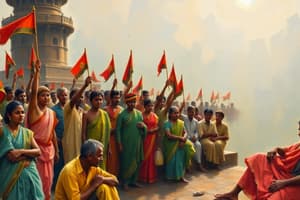Podcast
Questions and Answers
What was the main reason for the drain of wealth from India to Britain during the First Phase of Indian National Movement?
What was the main reason for the drain of wealth from India to Britain during the First Phase of Indian National Movement?
- Indian Association's promotion of Indian industries
- Influence of European nationalist movements on Indian politics
- Indian National Congress's demand for Indian representation in the British Parliament
- British exploitation of Indian resources (correct)
Which event led to the widespread protests and the Swadeshi Movement?
Which event led to the widespread protests and the Swadeshi Movement?
- Revolt of 1857
- Founding of the Indian Association
- Demands for Indian representation in the British Parliament
- Partition of Bengal (correct)
Who was known as the 'Grand Old Man of India' and advocated for Indian rights in the British Parliament?
Who was known as the 'Grand Old Man of India' and advocated for Indian rights in the British Parliament?
- A.O.Hume
- Surendranath Banerjea
- R.C.Dutt
- Dadabhai Naoroji (correct)
What was the main aim of the Indian National Congress founded in 1885?
What was the main aim of the Indian National Congress founded in 1885?
What was the outcome of the Swadeshi Movement?
What was the outcome of the Swadeshi Movement?
Which of the following was a social and economic factor that contributed to the First Phase of Indian National Movement?
Which of the following was a social and economic factor that contributed to the First Phase of Indian National Movement?
Who founded the Indian Association in 1876 to promote Indian interests?
Who founded the Indian Association in 1876 to promote Indian interests?
What was one of the key demands of the Indian National Movement during this phase?
What was one of the key demands of the Indian National Movement during this phase?
What was the outcome of the First Phase of Indian National Movement?
What was the outcome of the First Phase of Indian National Movement?
Flashcards are hidden until you start studying
Study Notes
First Phase of Indian National Movement (1857-1905)
Causes of the First Phase
- Social and Economic Factors:
- British exploitation of Indian resources
- Drain of wealth from India to Britain
- Destruction of Indian industries
- Land revenue policies
- Social and cultural changes
- Political Factors:
- Revolt of 1857 (Sepoy Mutiny)
- Demands for Indian representation in the British Parliament
- Influence of European nationalist movements
Key Events and Movements
- Indian Association (1876): Founded by Surendranath Banerjea to promote Indian interests
- Indian National Congress (1885): Founded by A.O. Hume, aimed at promoting Indian unity and self-rule
- Swadeshi Movement (1903-1908): Boycott of British goods, promotion of Indian industries
- Partition of Bengal (1905): Led to widespread protests and the Swadeshi Movement
Key Leaders
- Dadabhai Naoroji: Known as the "Grand Old Man of India", advocated for Indian rights in the British Parliament
- Surendranath Banerjea: Founded the Indian Association, promoted Indian nationalism
- R.C. Dutt: Economist and writer, advocated for Indian economic development
Demands and Achievements
- Demands:
- Indian representation in the British Parliament
- Reduction of land revenue
- Protection of Indian industries
- Achievements:
- Creation of the Indian National Congress
- Rise of Indian nationalism and awareness
- Laying the foundation for future movements
Causes of the First Phase of Indian National Movement
- British exploitation of Indian resources led to the drain of wealth from India to Britain
- Destruction of Indian industries due to British policies
- Land revenue policies caused economic hardship for Indians
- Social and cultural changes introduced by the British disrupted traditional Indian way of life
- The 1857 Revolt, also known as the Sepoy Mutiny, sparked the Indian national movement
- Demands for Indian representation in the British Parliament grew
- European nationalist movements inspired Indian nationalism
Key Events and Movements
- Indian Association founded in 1876 by Surendranath Banerjea to promote Indian interests
- Indian National Congress established in 1885 by A.O.Hume to promote Indian unity and self-rule
- Swadeshi Movement (1903-1908) boycotted British goods and promoted Indian industries
- The Partition of Bengal in 1905 led to widespread protests and the Swadeshi Movement
Key Leaders
- Dadabhai Naoroji, the "Grand Old Man of India", advocated for Indian rights in the British Parliament
- Surendranath Banerjea founded the Indian Association and promoted Indian nationalism
- R.C.Dutt, an economist and writer, advocated for Indian economic development
Demands and Achievements
- The Indian national movement demanded Indian representation in the British Parliament
- Reduction of land revenue was a key demand to alleviate economic hardship
- Protection of Indian industries was a major demand to promote economic development
- The creation of the Indian National Congress was a significant achievement
- The movement raised Indian nationalism and awareness, laying the foundation for future movements
Studying That Suits You
Use AI to generate personalized quizzes and flashcards to suit your learning preferences.




